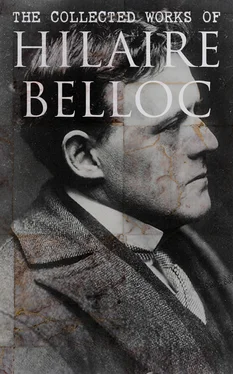The first is that the inferiority of Villars’ force made it impossible for him to do more than demonstrate against the army of observation. He was compelled to leave Tournai to its fate, and, indeed, the king in his first instructions, Villars in his reply, had taken it for granted that either that town or Ypres would be besieged and must fall. But the value of a fortress depends not upon its inviolability (for that can never be reckoned with), but upon the length of time during which it can hold out, and in this respect Tournai was to give full measure.
Secondly, it must be set down for the allies that their unexpectedly long task was hampered by exceptional weather. Rain fell continually, and though their command of the Scheldt lessened in some degree the problem of transport, rain in those days upon such roads as the allies drew their supplies by was a heavy handicap. The garrison of Tournai numbered thirteen and a half battalions, five detached companies, the complement of gunners necessary for the artillery, and a couple of Irish brigades—in all, counting the depleted condition of the French units at the moment, some six to seven thousand men. Perhaps, counting every combatant and non-combatant attached to the garrison, a full seven thousand men.
The command of this force was under Surville, in rank a lieutenant-general. Ravignon and Dolet were his subordinates. There was no lack of wheat for so small a force. Rationed, it was sufficient for four months. Meat made default, and, what was important with a large civil population encumbering the little garrison, money. Surville, the bishop, and others melted down their plate; even that of the altars in the town was sacrificed.
The first trench was opened on the night of the 7th of July, and three first attacks were delivered: one by the gate called Marvis, which looks eastward, another by the gate of Valenciennes, the third at the gate known as that of the Seven Springs. A sortie of the second of these was fairly successful, and upon this model the operations continued for five days.
By the end of that time a hundred heavy pieces had come up the Scheldt from Ghent, and sixty mortars as well. Four great batteries were formed. That to the south opened fire upon the 13th of July, and on the 14th the three others joined it.
The discipline maintained in the great camps of the besiegers was severe, and the besieged experienced the unusual recruitment of five hundred to six hundred deserters who penetrated within their lines. A considerable body of deserters also betook themselves to Villars’ lines, and the operations in these first days were sufficiently violent to account for some four thousand killed and wounded upon the side of the allies. Villars, meanwhile, could do no more than demonstrate without effect. Apart from the inferiority of his force, it was still impossible for him, until the harvest was gathered, to establish a sufficient accumulation of wheat to permit a forward movement. He never had four days’ provision of bread at any one time, nor, considering the length of his line, could he concentrate it upon any one place. He was fed by driblets from day to day, and lived from hand to mouth while the siege of Tournai proceeded to the east of him.
That siege was entering, with the close of the month, upon the end of its first phase.
It had been a desperate combat of mine and counter-mine even where the general circumvallation of the town was concerned, though the worst, of course, was to come when the citadel should be attacked. The batteries against the place had been increased until they counted one hundred and twelve heavy pieces and seventy mortars. On the night of the 24th of July the covered way on the right of the Scheldt was taken at heavy loss; forty-eight hours later the covered way on the left between the river and the citadel. The horn work in front of the Gate of the Seven Springs was carried on the 27th, and the isolated work between this point and the Gate of Lille upon the following day. Surville in his report, in the true French spirit of self-criticism, ascribed to the culpable failure of their defenders the loss of these outworks. But the loss, whatever its cause, determined the loss of the town. A few hours later practicable breaches had been made in the walls, ways were filled in over the ditches, and on the imminence of a general assault Surville upon the 28th demanded terms. The capitulation was signed on the 29th, and with it the commander sent a letter to Versailles detailing his motives for demanding terms for the civilian population. Finally, upon the 30th, 3Surville with 4000 men, all that was left of his original force of 7000, retired into the citadel and there disposed himself for as a long a resistance as might be. As his good fortune decided, he was to be able to hold with this small force for five full weeks.
To Marlborough is due the honour of the capitulation. The besieging troops were under his command, while Eugene directed the army of observation to the west. Marlborough put some eight thousand men into the town under Albemarle. A verbal understanding was given on both sides that the citadel would not fire upon the civilian part, nor the allies make an attack from it upon the citadel, and the siege of that stronghold began upon the following day, the 21st, towards evening. The operations against the citadel proved far more severe and a far greater trial to Marlborough’s troops than those against the general circumvallation of the town. The subterranean struggle of mine and counter-mine particularly affected the moral of the allies, and after a week a proposal appeared 4that the active fighting should cease, the siege be converted into a blockade, and only the small number of men sufficient for such a blockade be left before the citadel until the 5th of September, up to which date, a month ahead, at the utmost, it was believed the garrison could hold out. Louis was willing to accept the terms upon the condition that this month should be one of general truce. The allies refused this condition, and hostilities were resumed. 5
The force employed for containing the citadel and for prosecuting its siege had no necessity to be very large.
It was warfare of a terrible kind. Men met underground in the mines, were burned alive when these were sprung, were exhausted, sometimes to death, in the subterranean and perilous labour. The mass of the army was free to menace Villars and his main body.
But the admirable engineering which had instructed and completed the lines of La Bassée still checked the allies, in spite of superior numbers and provisionment still superior.
The effect of the harvest was indeed just beginning to be felt, and the French general was beginning to have a little more elbow-room, so to speak, for the disposition of his men through the gradual replenishment of his stores. But even so, Marlborough and Eugene had very greatly the advantage of him in this respect.
When the siege of the citadel of Tournai had been proceeding a little more than a week, upon the 8th of August the main body of the allies fell suddenly upon Marchiennes. Here the river Scarpe defended the main French positions. The town itself lay upon the further bank like a bastion. The attack was made under Tilly, and, consonantly to the strength of all Villars’ defensive positions, that attack failed. On the night of the 9th Tilly retired from before Marchiennes, after having suffered the loss of but a few of his men.
This action, though but a detail in the campaign, is well worth noting, because it exhibits in a sort of section, as it were, the causes of Malplaquet.
Malplaquet, as we shall see in a moment, was fought simply because it had been impossible to pierce Villars’ line, and Malplaquet, though a victory, was a sterile victory, more useful to the defeated than to the victors, because the defence had been kept up for such a length of time and was able to choose its own terrain.
Читать дальше












